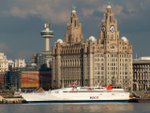
AMID the grime and gloom, it was a twin parallel ribbon of gleaming, airborne steel striding along the edge of Liverpool's lengthy waterfront, known affectionately by all as "The Dockers' Umbrella".
The closure of the Liverpool Overhead Railway, 50 years ago last week, prompted me to jokily write in the Daily Post that this was a psychological blow from which the city never really recovered.
But therein was a grain of truth. The Overhead was one of Liverpool's unique features that made this great seaport so special. No other city in Britain had such a spectacular urban transport system with electric trains rattling along some 20ft up in the air above the streets.
The LOR was a true pioneer and preceded similar networks in the US, again emphasising Liverpool's apartness as "Britain's North American city", sharing more in common with places across the Atlantic than others down the road.
Although long gone and still much-missed, what would be the LOR's impact be today had it not been closed on December 31, 1956, when replacing its entire decking (which carried the tracks) was deemed too expensive? Would the heritage era have come to its rescue?
Dr Adrian Jarvis, National Museum Liverpool's former port historian and author of A Portrait of the Liverpool Overhead Railway, says the system pioneered many aspects of modern railway now taken for granted.
"Although under seven miles long, the LOR was epoch-making. It was held in profound affection here because it was so unusual and unique in the UK. It was the world's first electric overhead railway - and Manchester didn't have one.
"By the time of closure, it was a financial liability and had been for a long time. Even back in 1913, the chairman explained its low returns because the huge growth in telephones meant fewer messenger boys using the trains."
But the main issue dated back to the LOR's construction. 
"The basic problem was that the Overhead was built on the cheap, using the Hobson construction system which was an extremely clever solution, but not a particularly enduring one.
"Its waterproof decking was part of the original parliamentary application - it had to be watertight, hence being nicknamed the Dockers' Umbrella.
"This meant that water lay undrained on the decking, which rusted the steel. Sulphurous smoke from dock shunting engines also rotted the decking's underside. One driver told me that, when he set off, his loco's exhaust literally blasted large lumps of scale on top of him.
"There was not only corrosion but chemical damage, with windborne grit getting into the sleepers and slowly grinding into the decking."
Paul Bolger, local historian and author, who wrote The Dockers' Umbrella, believes that, had the LOR been preserved, it might have been useful today.
"Had the Overhead survived as a privately-run, paying concern, it would have had to close intermediate stations and been highly truncated because of the motor car.
"It might have had a future as part of Liverpool's rush-hour traffic park and ride, with railheads at Crosby and Dingle.
"Built as a system for moving dock labour, the cessation of the traditional docks meant all the support industries went away.
"The city became a huge Polo mint, with everyone housed on the periphery. Survival would have needed a patient owner not interested in profit for a long, long time, but it would have complemented Albert Dock's tourism revival very well." 
The crunch came in 1956 when £2m was needed for the essential renewing of the decking. Neither its owners, Mersey Docks & Harbour Board, Liverpool City Council, nor the Ministry of Transport were interested in retaining the Overhead.
"I believe the city is partly to blame. The Victorians and Edwardians had a reputation for building solidly," says Bolger.
"The Overhead's life expectancy of 60 years for its cast-iron columns in Liverpool's steam and atmosphere is reasonable, but no funds were put aside by any organisation for its renewal. Yet it was so vital to the war effort and always immed- iately repaired so troop and naval personnel movements could keep going. Ten years later, it was declared sufficiently redundant to be scrapped.
"The management of the LOR is a typical British story. We always blame WWII for bringing this country to its knees, but huge profits were made from the industrial revolution onwards.
"Yet instead of retooling factories, our magnates were too busy gentrifying themselves and building big useless country houses. Winning the war was due to our ingenuity."
Dr Jarvis adds: "Apart from the structural problems, the crucial weakness in the LOR's survival is that the direction of trade has altered and is no longer north-south along the waterfront.
"Permission to recreate a new Overhead in front of the Pier Head's Three Graces doubtless would be opposed, although it predated them by 15 years."
peter.elson@dailypost.co.uk A British first >>> A British first THE Liverpool Overhead Railway was an ingenious solution to the problem of rapidly moving labour along a Dock Road which was already choked with goods traffic.
Truly a British first when it was opened on February 4, 1893, by the Prime Minister, Lord Salisbury, the Overhead boasted electrically-powered multiple-unit trains elevated on stilts above the Dock Road's horse-drawn congestion. Besides the cargo moving workforce, the LOR was used by ship repairers and a myriad of people taking paperwork between ships, offices and the Custom House.
Prof Peter Toyne, transport expert and former vice chancellor of Liverpool John Moores University, says: "The 50th anniversary of the LOR's closure is important for Liverpool as it was unique in Britain and indicated how go-ahead this city once was in devising rapid transport systems.
"I hope the new Pier Head Liverpool Museum will really showcase the significant history of Liverpool's railways.
"The Overhead would have been hugely expensive to restore and maintain, but it's an important part of British history and must be permanently commemorat-ed.
"Otherwise, it will be simply forgotten." |

















































No comments:
Post a Comment